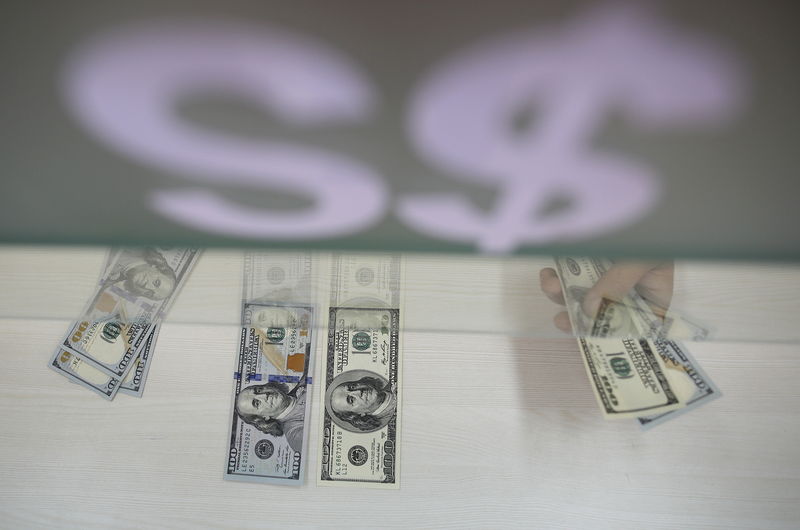Investing.com - The dollar slid against a basket of the other major currencies on Friday as investors remained on edge ahead of the upcoming U.S. presidential elections, despite a solid U.S. employment report for October.
The U.S. dollar index, which measures the greenback’s strength against a trade-weighted basket of six major currencies, slid 0.26% to 96.94. For the week, the index posted a fall of 1.27%.
Recent opinion polls have pointed to an increasingly uncertain outcome for the U.S. presidential election, rattling global financial markets and pressuring the dollar lower.
The Swiss franc, which investors often buy during times of market uncertainty, hit fresh five-week highs late Friday, with USD/CHF at 0.9680, off 0.59% for the day.
The dollar was fractionally higher against the safe haven yen, with USD/JPY last up 0.11% at 103.08, not far from Thursday’s one-month lows of 102.54.
The euro was higher against the dollar, with EUR/USD rising 0.32% to 1.1139, off session lows of 1.1080.
The dollar had initially strengthened against the euro after data showing that the U.S. economy continued to create jobs at a steady pace in October, although at a slightly slower rate than forecast.
The U.S. economy added 161,000 jobs in October from the prior month, the Labor Department said.
The unemployment rate ticked down to 4.9% last month from 5% in September.
Economists had expected 175,000 new jobs and a jobless rate of 4.9%.
The data supported expectations for a December rate hike by the Federal Reserve.
Investors are currently pricing in a 66.8% chance of a rate hike at the Fed's December meeting; according to federal funds futures tracked Investing.com's Fed Rate Monitor Tool.
Expectations of higher rates tend to boost the dollar, as higher borrowing costs make the currency more attractive to yield seeking investors.
But analysts have warned that the U.S. central bank could hold off on hiking rates if the election outcome sparks market volatility.
Meanwhile, sterling ended the week with gains of 2.74% against the dollar after the U.K. high court ruled Thursday that Prime Minister Theresa May must have parliament's approval to trigger the Brexit process in Brussels.
The ruling raised doubt on the government's timetable for launching Brexit talks, sparking a rally in the pound.
In the week ahead, the economic calendar is light but investors will be focusing their attention on the outcome of Tuesday’s U.S. presidential elections.
Trade and inflation data out of China will be watched for indications on the strength of the world’s number-two economy is performing.
Ahead of the coming week, Investing.com has compiled a list of these and other significant events likely to affect the markets.
Monday, November 7
In the euro zone, Germany is to release data on factory orders.
The UK is to release industry data on house price inflation.
Tuesday, November 8
China is to report on the trade balance.
The UK is to publish figures on industrial and manufacturing production.
Canada is to produce data on building permits and housing starts.
In the U.S., voting in the presidential election will take place.
Wednesday, November 9
China is to publish data on consumer and producer price inflation.
The European Commission is to publish its two-year economic forecasts for the European Union.
The Reserve Bank of New Zealand is to announce its benchmark interest rate and publish a policy statement which outlines economic conditions and the factors affecting the monetary policy decision.
Thursday, November 10
Canada is to release data on new house price inflation.
The U.S. is to publish the weekly report on initial jobless claims.
Friday, November 11
The U.S. is to round up the week with preliminary data on consumer sentiment and inflation expectations for the University of Michigan.
